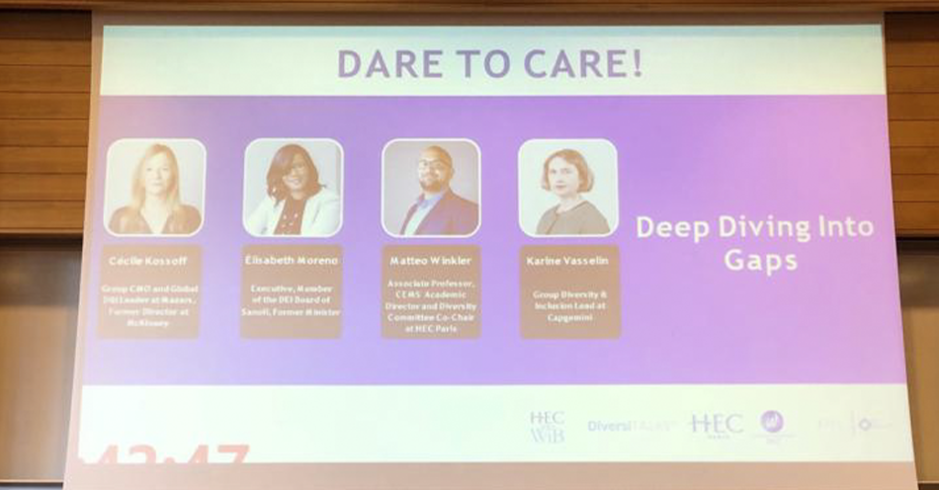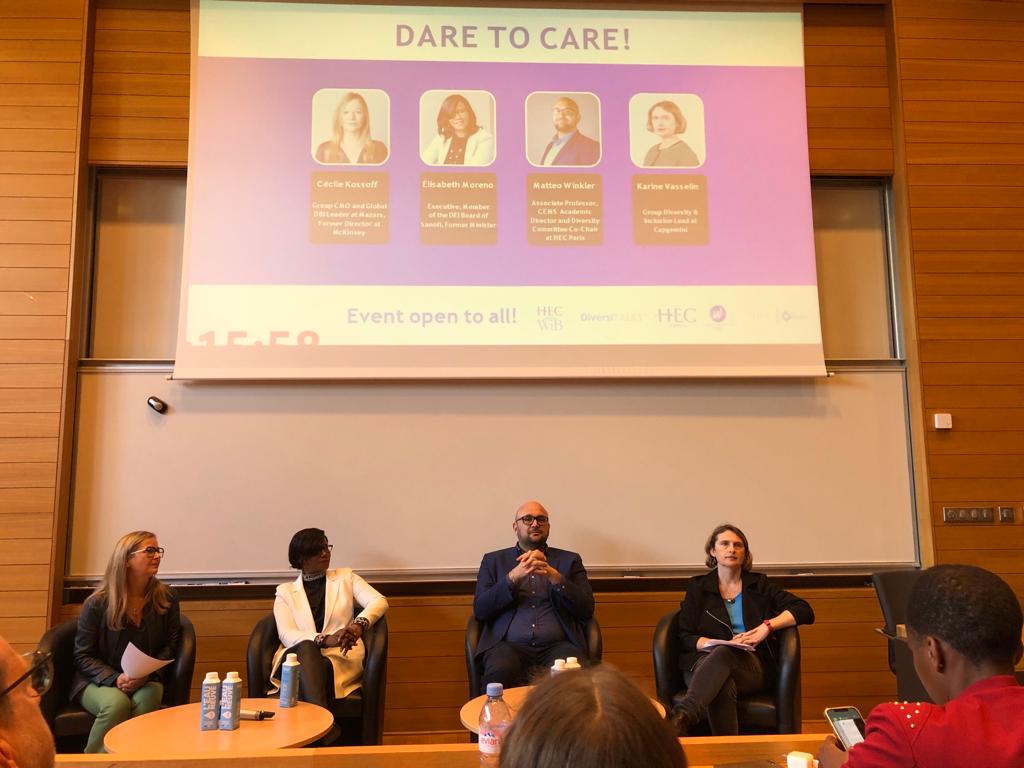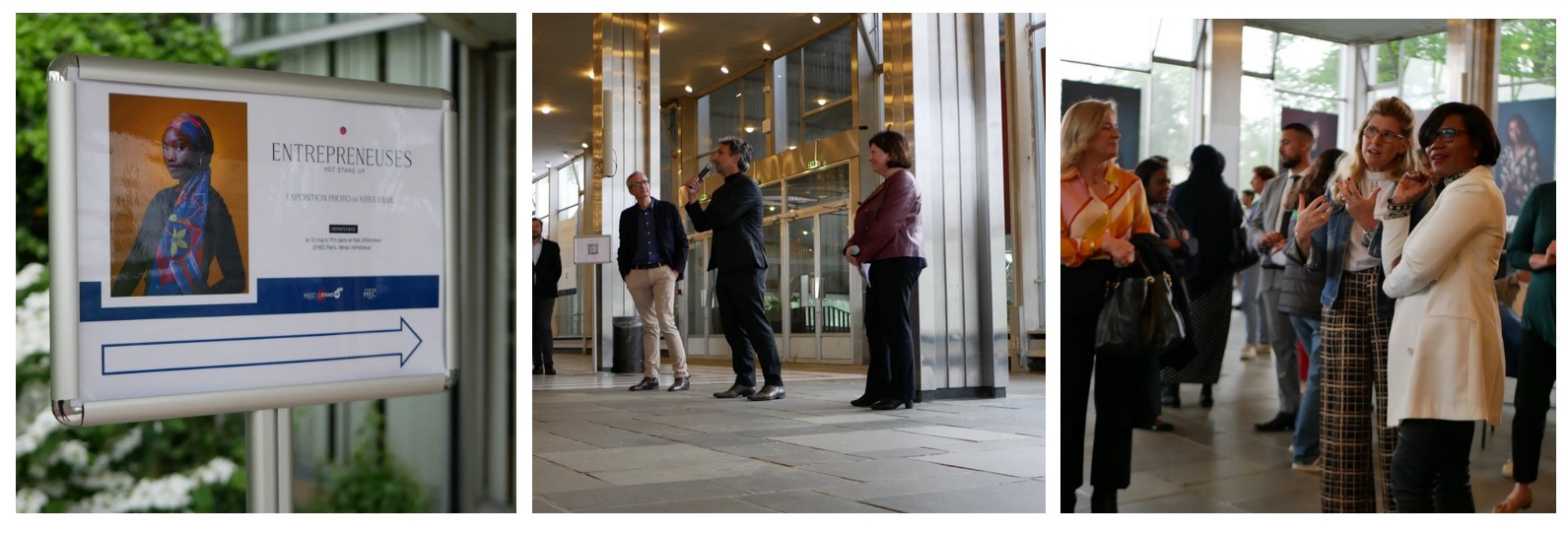Diversity, equity and inclusion in the workplace: Dare to care!
As part of the annual 50th-celebration of the gender mixity at HEC Paris, a new DiversiTalks Conference took place on May 10, 2023 on the Campus of Jouy-en-Josas to discuss the place of women at work. Top Diversity-Equity-and-Inclusion-leaders from the entrepreneurial sector, large companies and the french political institutions addressed the former and still-remaining biggest issues to reduce the gender-gap at work, but also pieces of advice to be more aware of our own biases in our modern society.

Auteur/Author of this article: Frédéric Voirin
For this new DiversiTalks, the HEC Women in Business Club, HEC Women in Leadership Club, and HEC NetPositive Club, have specificially come together with the same purpose to create a safe and inclusive space to engage in meaningful discussions about gender diversity and encourage positive change in the workplace and on campus!
The organizing students hosted with their clubs a panel discussion+Q&A featuring esteemed speakers sharing their perspectives on the gender gap in the economy and society, as well as the value of diversity and inclusion and how we can drive change in organizations and society.
The speakers of this DiversiTalks were:
Elisabeth Moreno, Executive member of the DEI Board of Sanofi, French former minister for gender equality
Cécile Kossoff, Group CMO and global DEI Leader at Mazars, former director at McKinsey
Karine Vasselin, Group Diversity & Inclusion Lead at Cap Gemini
HEC Prof. Matteo Winkler, law professor & co-chair of the HEC Diversity Committee
“Dare to care”, a call to HEC students for a better world
The organizing students of this conference launch a call to all HEC Students who want to play their part in creating a fairer, more balanced and more inclusive society? “Do you believe we are responsible for building a better world that allows everyone to contribute and create value? This conference is just for you!” said Elif DINç and Shemsi GHORFI, the 2 organizing lead-students in Master in management.
This panel addressed the challenges students and young professionals face daily. The discussion offered practical advice on identifying and overcoming biases, engaging in allyship, and fostering an inclusive workplace culture. This conference also quickly explored effective networking strategies like the value of mentorship (reverse mentoring, sponsoring) and peer support, and the power of collaboration in driving meaningful change to build solid confidence between staff members and create a more inclusive working environment.
This panel discussion offered the unique opportunity to hear speakers share their knowledge, personal stories, challenges, and triumphs experience on their path to driving gender diversity and inclusion improvements in organizations, government and society.
The three biggest issues women face at work
According to Cécile Kossoff, global DEI leader at Mazars, “women are discriminated in many dimensions: in our society, at work, everywhere!”. Kossoff goes even further and explains loud and clear that "the biggest challenge is salary! It's a concrete case of exclusion and the only category that we can really measure and act on!"
According to Kossoff, here are the 3 biggest issues at work for women in 2023:
1. The big difference between Men & Women is the confidence in succeeding. Most of the employed women are less confident in starting a new task, having a new job or managing projects than male employees
2. The double burden for Women: leading their job and their family
3. Unconscious Biases in a men’s world: “only 43% of men in senior management positions strongly agree that women are as good leaders as men” according to a Mazars-survey, meaning there are 57% that don’t think so.
"The biggest challenge is salary! It's a concrete case of exclusion and the only category that we can really measure and act on" (Cécile Kossoff, global DEI leader at Mazars)
About the first issue, most of the employed women are less confident in starting a new task, having a new job or managing projects than male employees. Karine Vasselin, DEI Lead at Cap Gemini, agrees and specifically emphasizes: “As a women you have to be above the expectations to fight against the discriminations, you don’t belong to the boy’s club. And even if nominated as #1 position, women always feel they’re a #2.”
The second issue is obvious: if you raise your children, you have less time to focus on other activities, like a job for example. And even if some progresses have been made in the gender balance, most of the women in the world keep on raising their children. On top of that the United Nations have indicated in June 2023 that Women keep being discriminated & prejudiced: “Half the people in the world still believe that men make better political leaders than women, and more than 40% believe that men make better business leaders than women" according to the United Nations Development Program. Prejudice is also reflected in the serious under-representation of women in leadership positions. On average, the proportion of women heads of state or government has remained at around 10% since 1995, and on the job market, women occupy less than a third of management positions.
About the third issue and more specifically about LGBTQIA+ community, all discriminations are not the same but the system of discriminating is the same and all subjects of discriminations need to be addressed, legally speaking. Elisabeth Moreno has a very clear point of view: “Although we are in a country of the human rights, not everyone has egal rights”. HEC Professor Matteo Winkler was a clear as the former French Ministry on that issue. For Winkler, "there's also a gap affecting the LGBT community: there are 30% less offers of employment for profiles with CVs mentioning LGBT-activities".
For HEC Prof. Winkler, “the visibility is the key, to maximize the awareness of the populations, like in marketing, with slogans like “Gay is good”.
Some pieces of advice to reduce our own biases
Despite this still-current pay gap, Cécile Kossoff remains positive: “there’s a clear way for change. Simply by contributing more in the economy. Diversity goes together with performance, financially and HR-speaking". There must be a virtuous circle! And still circle starts with a tiny point consisting in reducing our biases.
We all have biases. It’s common and it depends on the way(s) we’ve been educated and from our own professionnal or personal experiences. About our biases at work, a neutralization of them through team-processes and specific preventive learning programs could be done (especially via team-buildings). Rethinking performance in a men-dominated model: there is less and less a “Anytime Anywhere” logic and more and more addressing life-cycles' initiatives (like part-time jobs, specific leaves, new learning experiences), allowing for diverse Leadership Styles. Human-Resources processes to neutralize evaluations and promotion biases could be easily implemented in every company (ie diversity enabling infrastructure) but also at the top-level by CEOs themselves and an effective Top Management commitment.
Addressing the female double burden, more flexibility at work, parenthood programs led by companies, normalizing leave and parenting, decorrelating performance from long hours, paying attention to all the events in a woman’s career that make it much more difficult for them, quotas, bonus incentives and stop stigmatizing women were some of the potential solutions mentioned by the speakers.
“We can go to the moon, but we still don’t know how to care for another human being” (Elisabeth Moreno, exec.member of the DEI Board of Sanofi)
According to Elizabeth Moreno , “Human beings need love, attention and we have to think about daring to care. Isn’t it crazy that we need to care for another person, even in 2023 ?!” The French former minister for gender equality did explain with no pathos that she was discriminated because of being a woman, a black person and a disabled being. She emphasizes with a nice formula: "we can go to the moon, but we still don't know how to care for another human being".
Elisabeth testified in front of a captivated student audience that “nobody was expecting me to become an entrepreneur: I had not study engineering, but I was brave and curious enough to do it and I started at 20 with 3 employees and reached 30 a few years after.”
She just continued by affirming with motivation that "the only difference, that really exists, is the number of opportunities you were given, so you shouldn't let anyone stop you from being who you are."
A festive conclusion for this special DEI-Day at HEC
After an engaging and thought-provoking discussion Q&A session of the DiversiTalks, another Diversity event at HEC was launched: the big opening of the HEC StandUp exhibition by the photograph and HEC alumnus Steve Fiehl (H.88). HEC Stand Up is a unique training program offered by the Innovation & Entrepreneurship Center of HEC Paris. It enables women from all social backgrounds to realize their entrepreneurial aspirations. So, students, women entrepreneurs, DEI-specialists, professors and HEC staff but also external guests and families connected and continued the conversation, in a continuously relaxed and informal setting. It was the case for Thandiwe Mkhetshane, MBA-soon-to-be-graduated student, who had the chance to discuss with the former French minister for gender equality about fashion as a real weapon of choice to fight discriminations.
As a festive conclusion, a networking cocktail closed this special day at HEC and students altogether with panelists celebrated in the hall of honour to discover the HEC Stand Up Women Entrepreneurs’ exhibition by Steve Fiehl (H.88).
This exhibition is once-in-a-lifetime experience showcasing portraits of inspiring women who benefited from the socially-inclusive programme StandUp. Shot by Steve Fiehl (H.88), former entrepreneur, business angel and photographer and prepared in collaboration with the HEC Innovation & Entrepreneurship Center and the HEC Foundation, this brand-new exhibition is displayed at HEC until July 2023 and should be showcased in other french cultural and institutional venues after the summer. Read more about this grand opening in this article
“Myths and barriers preventing the progression of women” (Mazars online report)
GO FURTHER: The DiversiTalks at HEC Paris
The DiversiTalks are specific events related to Diversity, Equity and Inclusion. They were launched in 2017 by the always-operating Prof. of law at HEC Paris, Matteo Winkler, to discuss DEI-topics like gender studies, discriminations in our societies and HR-engaging global matters like being yourself at work. Check the various Diversity, Equity and Inclusion Initiatives led by HEC Paris here

